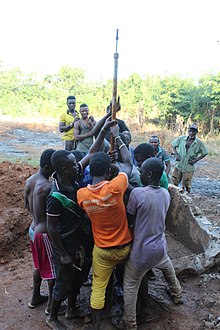
Back رفتار کمک کردن Persian सहायतापूर्ण बरताव Hindi 援助行動 Japanese 돕는 행동 Korean Gargaar Somali 幫助 Chinese

Helping behavior refers to voluntary actions intended to help others, with reward regarded or disregarded. It is a type of prosocial behavior (voluntary action intended to help or benefit another individual or group of individuals,[1] such as sharing, comforting, rescuing and helping).
Altruism is distinguished from helping behavior in this way: Altruism refers to prosocial behaviors that are carried out without expectation of obtaining external reward (concrete reward or social reward) or internal reward (self-reward). An example of altruism would be anonymously donating to charity.[2]
- ^
- Eisenberg, Nancy; Mussen, Paul Henry (1989). The Roots of Prosocial Behavior in Children. Cambridge: Cambridge University Press. ISBN 0-521-33771-2.
- Siegler, Robert S. (2006). How children develop, exploring child development student media tool kit & Scientific American Reader to accompany how children develop. New York: Worth Publishers. ISBN 0-7167-6113-0.
- ^ Miller, P.A.; Bernzweig, J.; Eisenberg, N.; Fabes, R.A. (1991). "The development and socialization of prosocial behavior". In Hinde, Robert Aubrey; Groebel, Jo (eds.). Cooperation and Prosocial Behaviour. New York: Cambridge University Press. pp. 54–77. ISBN 0-521-39999-8.